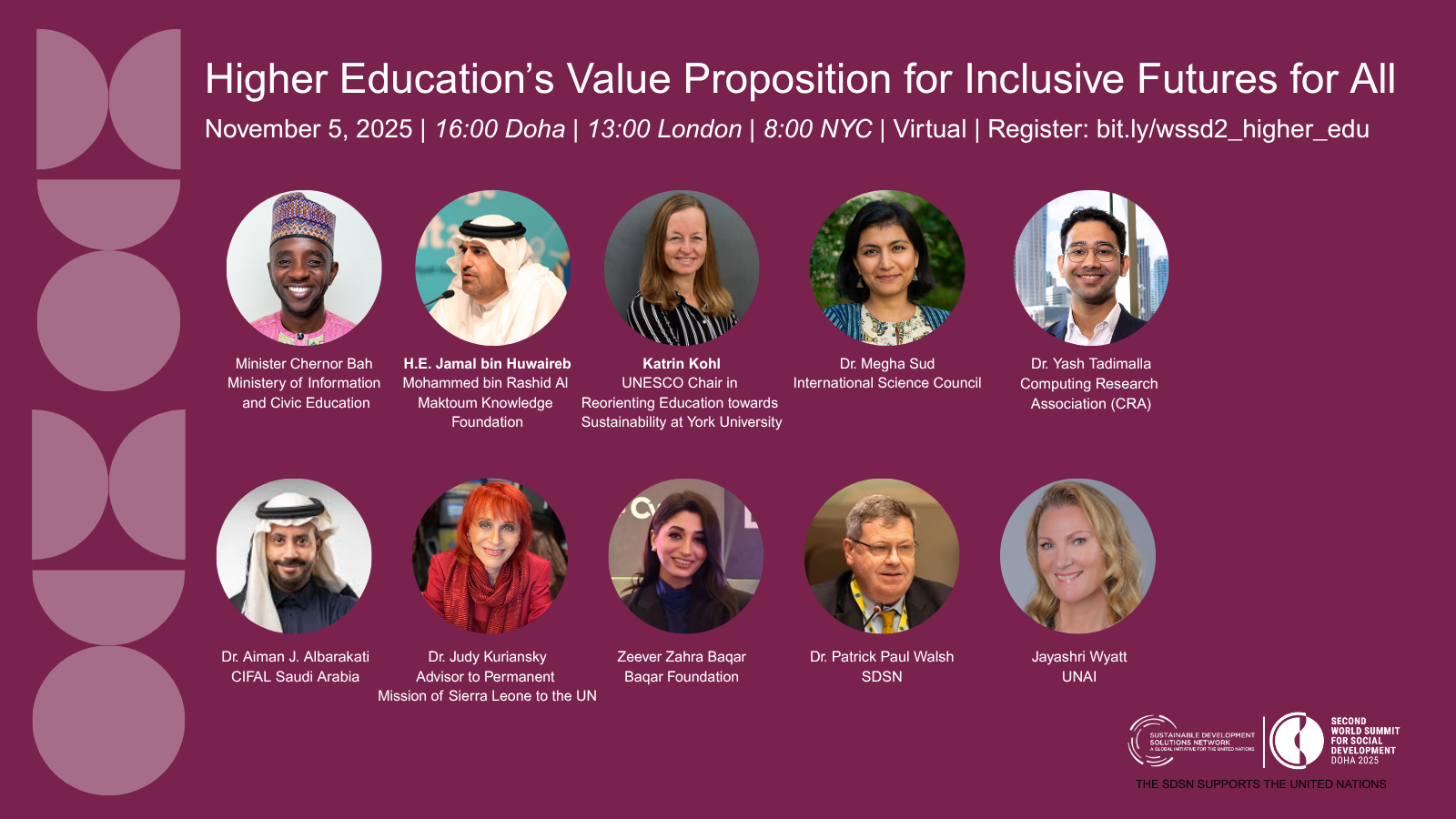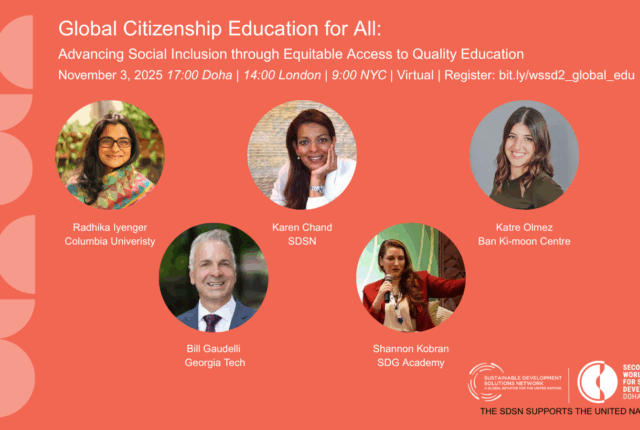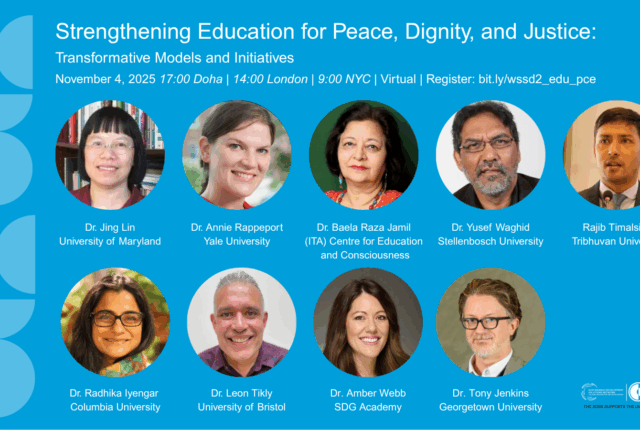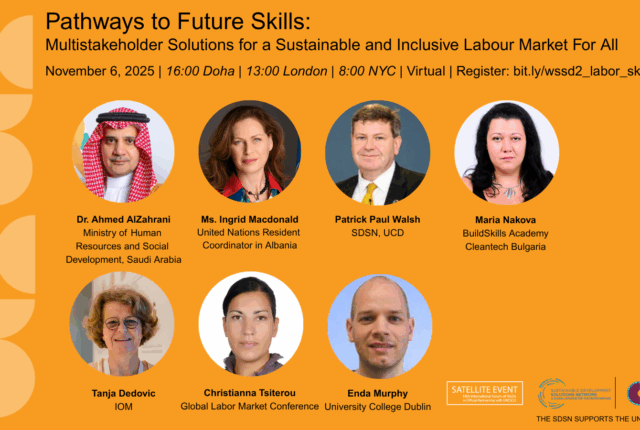A Side Event of the Second World Summit for Social Development
“Let us invest not only in classrooms, but in conscience. Let us code not only machines, but morals. Let us finance not only infrastructure, but imagination. If we can do this together, then education will not merely respond to the future, it will define it.”
This powerful call to action, delivered on behalf of Sierra Leone’s Minister of Information and Civic Education, Chernor Bah, set the tone for a transformative webinar exploring how higher education can drive inclusive social development in an era of unprecedented global challenges.
As an estimated 8,000 participants gathered in Doha, Qatar, and virtually for the Second World Summit for Social Development, the SDG Academy’s event, “Higher Education’s Value Proposition for Inclusive Futures for All,” brought together stakeholders to examine higher education’s critical role in achieving the UN’s 2030 Agenda. With minimal progress on the SDGs, the Solution Session emphasized a key message: science and higher education must be further integrated into the UN’s 2030 Agenda and policy development.
Organized by University College Dublin, the Government of Ireland SDG Champions Program, and the SDG Academy at UN Sustainable Development Solutions Network (SDSN), alongside numerous co-organizers including UNAI, UNESCO, UNITAR, and the International Science Council, the webinar demonstrated the power of multilateralism in action.
Minister Chernor Bah’s statement, presented by Timothy Sam, Head of Partnerships at the Ministry of Information and Civic Education, offered a compelling narrative of how education can heal and transform societies. The Ministry’s pioneering digital civic education transformation integrates national curriculum with technology, storytelling, and decolonized history.
Looking ahead, Sierra Leone is partnering with the Government of Ireland and University College Dublin to establish a digital education transformation hub in Africa. This groundbreaking partnership will leverage artificial intelligence and digital innovation to advance inclusive education and sustainable skills for youth across the continent.
Knowledge as a Global Public Good: The UAE Perspective
His Excellency Jamal bin Huwaireb, CEO of the Mohammed bin Rashid Al Maktoum Knowledge Foundation, offered a complementary vision through his statement read by Dr. Patrick Paul Walsh. At the heart of MBRF’s philosophy lies a fundamental principle: knowledge for the public good is the foundation stone of education at all levels.
MBRF is working to address these gaps through several transformative initiatives. The Knowledge Index, developed with UNDP, helps nations measure and advance their knowledge and innovation systems. The Knowledge Summit brings together global leaders to exchange ideas that shape education and sustainable development.
Repositioning Higher Education in Global Development
Dr. Katrin Kohl, chair of the Hub of SDG 10 at UN Academic Impact and co-chair of the UNESCO Chair in Reorienting Education Towards Sustainability at York University, presented a critical perspective on higher education’s evolving role. While education access remains important, she emphasized that education attainment still correlates with unsustainable lifestyles—a paradox that education for sustainable development must address.
Dr. Kohl presented a collaborative initiative bringing together UN Academic Impact (UNAI), SDSN, the International Association of Universities, the International Science Council, and multiple UN agencies to reposition higher education as a vital stakeholder in sustainable development discussions. During the July 2025 UN High-Level Political Forum, the group created a consensus statement covering critical themes:
- Democratic values, trust, and responsibility in the face of threats to science and higher education
- Integration of sustainability and the SDGs in higher education as a role model for a sustainable society
- Knowledge, inclusion, and decolonization
- Science, technology, innovation, and responsible AI deployment
- Systemic change in governance and funding structures
The initiative will now move into broader consultation through an online survey, aiming to strengthen higher education’s seat at the table for the remaining years of the SDGs and to inform the post-2030 agenda.
A Musical Interlude: Hope Is Alive
In a moving segment that demonstrated the power of cultural diplomacy, internationally acclaimed composer and pianist Russell Daisey performed “Hope Is Alive,” an original anthem co-created with Dr. Judy Kuriansky during the Ebola crisis in Sierra Leone.
Multi-Stakeholder Solutions: A Roundtable Discussion
Flipping the Science Model for Sustainability
Dr. Megha Sud, Senior Science Officer at the International Science Council, presented findings from a multi-year exercise with science funders who asked a critical question: Why are we funding all this science aimed at SDGs, yet remain so far from meeting targets?
The answer lies in recognizing that achieving SDGs is far more complex than going to the moon. It requires getting into the messiness of nexus issues that cross SDGs, sectors, and stakeholder groups. Yet science is not currently incentivized to work this way. Researchers are assessed by publications in high-impact journals and institutional prestige, working within project-based funding that doesn’t provide time or resources to engage deeply with communities they hope to serve.
The solution is transdisciplinary, mission-oriented science that flips the traditional model.
Open Education Resources for Global Equity
Dr. Patrick Paul Walsh highlighted UNESCO’s 2019 Open Education Resources Recommendation, signed by all UN member states, which establishes that education resources should be created with equity for the public good and made freely available to everyone worldwide.
The Third World OER Congress, held in Dubai in November 2024, explored how emerging technologies like AI can advance open education while ensuring that nowhere on earth—even refugee camps—lacks potential access to education and accreditation.
Dr. Walsh showcased Dublin University Press as a working model, demonstrating how communities can publish and create material at the highest academic standards, archive it according to best practices, and make it free to create and use.
Youth Empowerment Through Science Policy Interface
Dr. Sri Yash Tadimalla, a Computing Innovation Fellow and global focal point for the UN Major Group for Children and Youth Science Policy Interface, brought a critical youth perspective to the discussion. Too often, young people are excluded from the design phase of programs and policies directly affecting them, brought in only afterward for consultation. The Science Policy Interface, created in 2016, addresses this by building tools to drive evidence-informed, context-specific, and appropriate technology-oriented innovation solutions generated by young people in their communities and highlighted at the global level.
Dr. Tadimalla identified four critical ways higher education intersects with and empowers youth:
- As a training ground for policy – Providing skills to translate expertise into global governance contexts
- In research ecosystem co-design – Involving students as co-designers, not just participants
- As a catalyst for trust and dialogue – Creating intergenerational spaces in communities, not just journals
- As knowledge hubs – Serving as custodians of truth that centers Indigenous contexts and Global South perspectives
The call to action: higher education must shift from teaching to partnering, empowering young people as knowledge creators and co-designers while supporting them to become social changemakers through entrepreneurship, innovation, and engagement with local government.
LEAPFAST: Transforming Universities Into Living Laboratories
Dr. Aiman Al-Barakati, Associate Professor at Majmaah University and Director of CIFAL Saudi Arabia (affiliated with UNITAR), introduced LEAP-FAST, the Leadership in Higher Education Alliance and Program for Accelerating Sustainability Transformation.
LEAPFAST mobilizes deans and faculty from every region to drive whole-institution transformations. The program embeds the SDGs into education, research, operations, and community life through four interconnected pillars:
- Leadership Dialogue – Annual convening at the UN High-Level Political Forum where university presidents and ministers co-create joint statements
- Certificate Program – A three-month blended course empowering faculty teams to redesign curricula and institutional strategies
- SDG Ambassadors Program – Graduates mentor colleagues and implement measurable actions across institutions
- Regional and National Spin-offs – Universities replicate the model, engaging ministers, accreditation bodies, and industry partners
A recording of the event can be found below, on the SDSN YouTube Channel, or in the SDG Academy Library.



